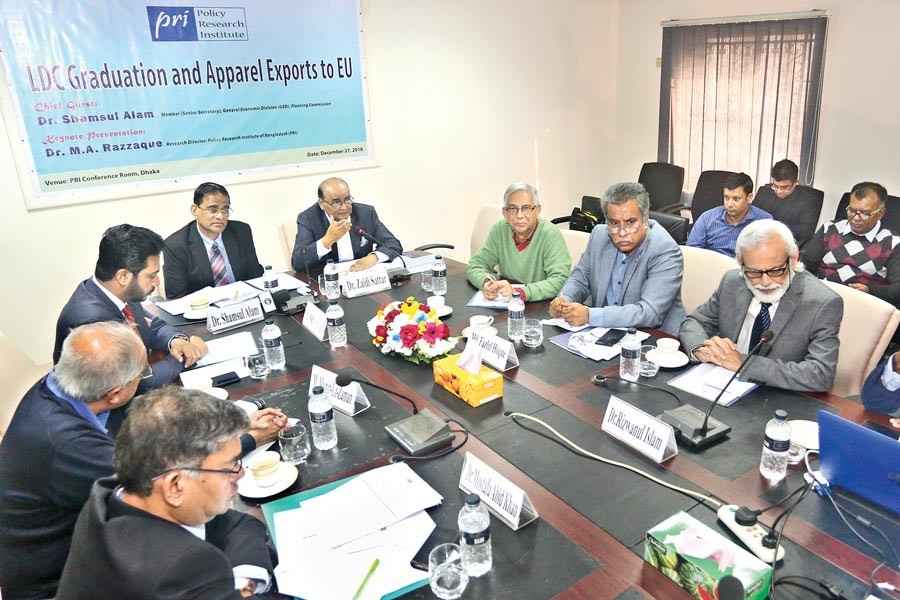Bangladesh has the potentials of earning an additional amount of $17.4 billion from the global market with its existing export capacity, of which $11.4 billion can come from the European Union (EU) alone, according to a latest research.
The country fetched $21 billion by exporting goods to EU in last fiscal year (FY), 2017-18, while $19.6 billion came from export of ready-made garments (RMG), it said.
The average yearly growth of Bangladeshi RMG products to EU is 12 per cent from 2008 to 2017, it showed.
The findings were disclosed at a seminar titled 'LDC Graduation and Apparel Exports to EU', organised by Policy Research Institute of Bangladesh (PRI) at its conference room in the city on Thursday.
PRI Chairman Dr Zaidi Sattar moderated the programme, while Member (General Economics Division) of Planning Commission Dr Shamsul Alam was present as the chief guest.
Mr Sattar said protection policy undercuts export incentives, while protection and export policies are in conflict.
"The domestic market is no substitute for the vast global market that exports create, and 8.0 to 10.0 per cent growth cannot be ensured by the domestic market only."
He suggested transformation of the existing trade policy.
The major constraints in full utilisation of the export potentials include low productivity and poor infrastructure, said PRI Research Director M A Razzaque while presenting the research findings.
Bangladesh might lose apparel business worth $1.6 billion to EU once it graduates from an LDC (least developed country) to a developing country in 2027. It might happen, as the local garment products will be subject to face 8.0 per cent to 10 per cent duty on export there.
Bangladesh would continue to enjoy zero-duty benefit on RMG export to EU, if the country can obtain Generalised Scheme of Preferences (GSP) Plus status.
But there is little possibility of achieving the status there with the current status of export, he further said.
If the standard GSP facility is allowed to Bangladesh, the local apparel exporters will have to face 8.0 to 10.0 per cent duty in sending their products to EU market, he noted.
Currently, EU is the largest export destination for Bangladesh, he added, suggesting proactive engagement for extending the transition period and relaxation of qualification criteria for GSP Plus.
Other recommendations placed in the seminar included building coalition with other graduating LDCs, signing possible trading arrangements (like FTA) with EU, moving towards manufacturing more value added items, adoption of technological upgradation, attracting higher foreign direct investment (FDI), and tackling excessive cost of doing business etc.
Terming the report 'excellent', Mohammadi Group Managing Director Rubana Huq said the pattern of consumerism needs to be taken into account, as the consumers are not buying same products and in same quantities.
The country's image, especially regarding labour force, must be changed. Otherwise, outside interventions will continue to happen using labour issues as an excuse, she opined.
Simply ratification does not ensure compliance with the EU-set conventions, as out of the 27 conventions, eight major ones are related to labour, she noted.
"Moreover, we should not consider just achieving the standard GSP, as we can't afford imposition of 8-9 per cent duty at this point."
Preparedness is a must to face the challenges of graduating from LDC, she noted.
Md Fazlul Hoque, former president of Bangladesh Knitwear Manufacturers and Exporters Association (BKMEA), however, ruled out the possibility of any negative impact on export to EU once the country graduates from LDC. Absorbing imposition of 10 per cent duty on export to EU will not be a problem for the Bangladeshi exporters. Every year the local exporters face 5.0 per cent higher cost of production for different reasons, he opined.
Buyers also take advantage of 5-6 per cent (lower pricing of items) due to poor negotiation skills of the exporters, he noted.
So, upon graduation from LDC, the buyers will also realise the situation, and pay some more. It is also expected that the production cost will reduce by the next seven to nine years, he added.
Rather, there is a possibility of China's losing RMG business worth $30 billion by the next seven to eight years. Vietnam, Cambodia and Myanmar do not have the capacity to grab this Chinese shift, he added.
Bangladesh Trade and Tariff Commission Member Mostafa Abid Khan said, "I do not think the buyers will automatically move to other countries overnight. China is interested to invest in the garment sector of Bangladesh."
Mr Shamsul Alam said, "The government will address the trade-related issues more efficiently in the country's eighth five-year plan, to be formulated in next March." He also said the government will reveal outcomes of the LDC graduation study in next June to take necessary measures, so that the country's export increases.
Bangladeshi garment products are currently subject to 15.62 per cent duty in the US market, and still the local exporters are performing well there. They will also be able to perform strongly in EU markets despite facing 10 per cent duty after the graduation from LDC, he added.
Bangladesh Garment Manufacturers and Exporters Association (BGMEA) Vice President Mohammed Nasir favoured fetching FDI in backward linkage of woven segment.
Munni_fe@yahoo.com


